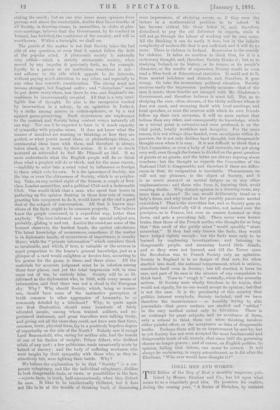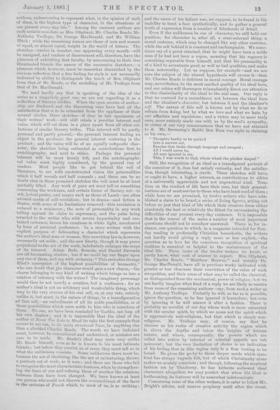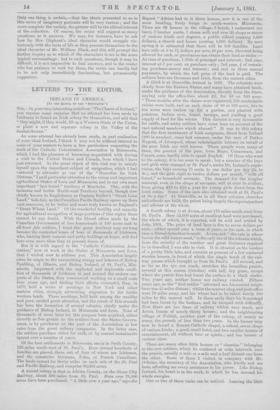IDEAL MEN AND WOMEN.
THE Editor of the Day of Rest, a monthly magazine, pub- lished by Messrs. Strahan and Co., has hit upon what seems to us a singularly good idea. He promises his readers, during the coming year, "A Series of Sketches, by eminent
authors, endeavouring to represent what, in the opinion of each of them, is the highest type of character, in the situations of our present every-day life," Among the eminent authors are -such notable novelists as Mrs. Oliphant, Mr. Charles Reade, Mr. Anthony TroIlope, Dr. George MacDonald, and Mr. William Black; while the remaining names are those of men and women of equal, or almost equal, weight in he world of letters. The :sketches—twelve in number, one appearing every month—will be unsigned, and readers of discernment will, therefore, have the Pleasure of exhibiting that faculty, by announcing to their less illuminated friends the names of the successive sketchers,—a pleasure which, however, must be somewhat diminished by the obvious reflection that a fine feeling for style is not necessarily indicated by ability to distinguish the touch of Mrs. Oliphant from that of Mr. Reade, or the modelling of Mr. Trollop° from that of Dr. MacDonald.
We need hardly say that in speaking of the idea of the series as a singularly good one, we are not regarding it as a .collection of literary riddles. When the open secrets of author-
ship are disclosed, and the discerning ones have had all the satisfaction that is to be extracted from the applause of their several circles, these sketches—if they be fair specimens of tlieir writers' work—will still retain a peculiar interest and -value, which will set them in a place apart from all other col- lections of similar literary trifles. This interest will be partly personal and partly general,—the personal interest finding an object in the producer, the general interest centreing in the product ; and the value will be of an equally coitiposite char- acter, the sketches being estimated as contributions first to -autobiography, and next to ethics. Perhaps the personal 'interest will be most keenly felt, and the autobiographi- cal value most highly considered, by the general run of readers. Most people like to get behind the veil of literature, to see with unobstructed vision the personalities -which it half reveals and half conceals ; and there can be no doubt that in these promised sketches the veil must be at least partially lifted. Any work of pure art must tell us something 'concerning the workman, and certain forms of literary art—to wit, lyrical poetry, and essays such as those of Lamb—are often avowed media of self-revelation; but in drama—and fiction is drama, with some of its limitations removed—this revelation is reduced to a minimum ; the note of personality in any work -telling against its claim to supremacy, and the palm being -awarded to the writer who, with severe impartiality and sus- tained reticence, leaves his creations in white light, uncoloured by hues of personal preference. In a story written with the explicit purpose of delineating a character which represents -the author's ideal man or woman, this unwritten law is, however, necessarily set aside ; and the new liberty, though it may prove -prejudicial to the art of the work, indefinitely enlarges the scope of its interest. Adam Bede, Romola, and Daniel Deronda are all fascinating studies ; but if we could lay our finger upon -any one of them, and say with certainty," This embodies George Eliot's conception of the highest possibilities of humanity," who can doubt that he character would gain a new charm,—the 'charm belonging to any kind of writing which brings us into a relation of intimacy with the writer? The imaginary personage would then be not merely a creation, but a confession ; for an -author's ideal is not an arbitrary and incalculable thing, which may be the very reverse of hie real self, or, at any rate, entirely unlike it, but must, in the nature of things, be a transfiguration Aof that self,—an embodiment of all its noble possibilities, or of those possibilities which seem noble to him who is conscious of them. No one, we have been reminded by Goethe, can leap off his own shadow ; and it is impossible that the ideal of the author of Never Too Late to Mend (to take the first example that occurs to us) can, in its main structural lines, be anything else than a glorified Charles Reade. The words we have italicised must, however, be remembered and understood, or mistakes are -sure to be made. Mr. Reade's ideal may seem very unlike Mr. Reade himself, even as he is known to his most intimate friends ; but before they convict us of error, they must tell us in what the unlikeness consists. Some unlikeness there must be, because the act of idealising, like the act of caricaturing, throws a portrait out of scale, as it were ; and there are those who fail to recognise the most characteristic features, when by strengthen- tug the lines of one and refining those of another the relations 'between them have been changed. We have known at least one person who could not discern the vraisemblance of the faces An the f,artoons of notch which, to most of us, is so striking ;
and the cause of his failure was, we suppose, to be found in his inability to treat a face synthetically, and to gather a general truth of expression from a number of falsehoods of detail. Even if the unlikeness be one of character, we still hold our position; for character is, after all, a semi-external thing, a moral costume, which may be changed like any other costume, while the self behind it is constant and unchangeable. We some- times say of a great criminal, that he might have been a noble man if he had not been a rogue, meaning that his roguery is something separable from himself, and that his personality is of a kind to accentuate good, as well as bad qualities, and make them noteworthy. Let us suppose, for example—and we are sure the subject of the absurd hypothesis will excuse it—that Mr. Charles Reade is deficient in moral courage. Moral courage may, nevertheless, be the most marked quality of his ideal hero, and our critics will thereupon triumphantly direct our attention to this dissimilarity of the ideal to the real man. Our reply is that we contend for a resemblance not between the ideal hero and the idealiser's character, but between it and, the idealiser's self. The nature of this self is known not by what we do or refrain from doing, but by what we love and what we hate, by our affinities and repulsions ; and a virtue may be more truly ours, more entirely made one with us by the soul's sympathy, in virtue of our very consciousness that we have not attained to it. Mr. Browning's Rabbi Ben Ezra was right in claiming as his own,—
" Thoughts hardly to be packed
Into a narrow act, Fancies that broke through language and escaped ; All I could never be, All men ignored in me, This, I was worth to God, whose wheel the pitcher shaped."
Still, the recognition of an ideal as a transfigured portrait of the conceiver of it, does but satisfy curiosity, and the satisfac- tion, though interesting, is sterile. These sketches will have, or ought to have, a higher interest, as contributions to ethics of a universally appreciable and not unpractical kind. Trea- tises on the conduct of life have their uses, but their general- isations'are of most service to those who have least need of them ; while hero we are promised, by twelve writers who have esta- blished a claim to be heard, a series of living figures, acting out before us just that kind of life which their creators deem either absolutely the best or relatively the fittest for encountering the difficulties of our present every-day existence. It is impossible that in the course of the series a number of most important questions should not be somehow answered. There is, for in- stance, one question to which, in a magazine intended for Sun- day reading in professedly Christian households, the writers can hardly avoid giving a reply more or less explicit,—the question as to how far the conscious recognition of spiritual realities is essential or helpful to the maintenance of the ideal lifo. From some of the twelve writers we know, or partly know, what sort of answer to expect. Mrs. Oliphant, Mr. Charles Reade, "Matthew Browne," and notably Dr. George MacDonald, have all in previous works indicated with greater or less clearness their conviction of the value of such recognition, and their sense of what may be called the chemical, as distinguished from the mechanical, power of religion ; bat we can hardly imagine what kind of a reply we are likely to receive from some of the remaining authors—say, from such a writer as Mr. Anthony Trolley. Probably lie will, so far as is possible, ignore the question, as he has ignored it heretofore ; but even by ignoring it he will answer it after a fashion. There is probably no novelist of our day whose work is more saturated with the secular spirit, by which we mean not the spirit which is aggressively anti-religious, but that which is simply non- religious. Mr. Trollope may, of course, say that he chooses as his realm of creative activity the region which is above the depths and below the heights of human nature, and where, consequently, the powers which are called into action by infernal or celestial appeals are left quiescent; but the very limitation of choice is an indication of his feeling that in this region only is a firm footing to be found. He gives the go-by to those deeper needs which man- kind has always vaguely felt, but of which Christianity alone makes us acutely conscious ; and though, following the sceptical fashion set by Thackeray, he has hitherto eschewed ideal characters altogether, we may predict that when his ideal is forthcoming, its features will be somewhat indeterminate.
Concerning some of the other writers, it is safer to follow Mr. Bright's advice, and reserve prophecy until after the event. Only one thing is certain,—that the ideals presented to us in this series of imaginary portraits will be very various ; and the more complete the variety, the greater will be the ethical interest of the collection. Of course, the series will suggest as many questions as it answers. We may, for instance, have to ask how far Mrs. Oliphant's ideal character would. struggle vic- toriously with the facts of life as they present themselves to the ideal character of Mr. William Black, and this will prompt the further inquiry as to which of the characters is set in the more typical surroundings ; but to such questions, though it may be difficult, it is not impossible to find answers, and to the reader who has patience to seek for them, the series can hardly fail to be not only immediately fascinating, but permanently suggestive.
















































 Previous page
Previous page